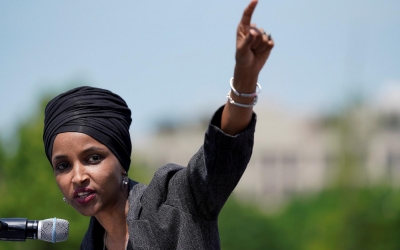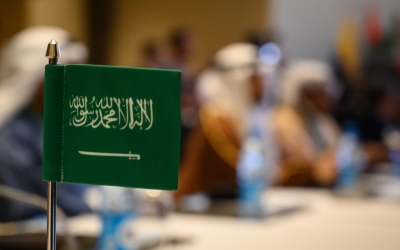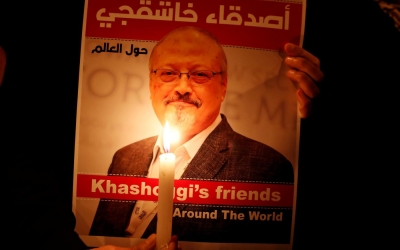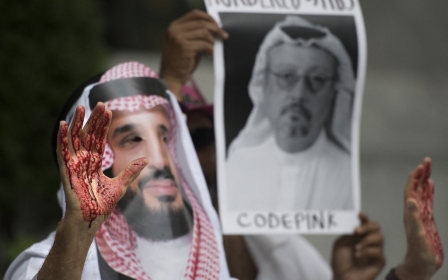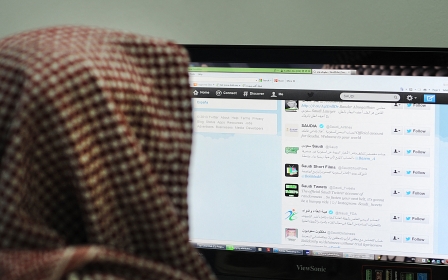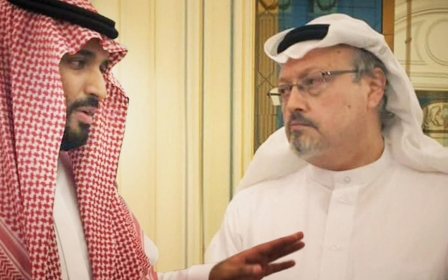Advocates target Saudi Arabia's PIF over MBS' role in Khashoggi murder

While the debate over whether to sanction Saudi Arabia's Crown Prince Mohammed bin Salman rages on in Washington, advocates have quietly begun laying the groundwork for a campaign targeting the kingdom's coffers.
Buoyed by new revelations that the country's $400bn sovereign wealth fund owned the two jets that ferried Jamal Khashoggi's killers to Istanbul, advocacy groups are exploring ways to go after a key instrument in Prince Mohammed's vision to transform the oil-dependent kingdom into a high-tech economy of the future.
"Saudi Arabia's Public Investment Fund was directly involved in the assassination of Jamal Khashoggi by using its planes to transport the monarchy's assassins," said Sunjeev Bery, the executive director of Freedom Forward, an advocacy group that aims to end US support for non-democratic countries.
"That's a clear argument for the Biden administration putting sanctions on the senior leadership of Saudi Arabia's sovereign wealth fund," including its chairman, Prince Mohammed.
New MEE newsletter: Jerusalem Dispatch
Sign up to get the latest insights and analysis on Israel-Palestine, alongside Turkey Unpacked and other MEE newsletters
'Companies that are connected to the Saudi monarchy are going to find themselves facing a lot of tough questions'
- Sunjeev Bery, Freedom Forward
The campaign is also expected to put pressure on US and western investors to stay away.
"For a long time, businesses have held the political behaviors of the Saudi monarchy at a rhetorical arm's length while doing business with the Saudi monarchy via its financial institutions," Bery said. "Now we know that there's basically no difference - that the leading investment fund of the Saudi monarchy is itself completely tied up in the brutal repression of that same government."
Freedom Forward and its allies fired their first salvo on Tuesday with the release of a statement signed by 42 liberal groups calling for sanctions against Prince Mohammed and other PIF leaders following Friday's release of the US intelligence assessment of the crown prince's role in Khashoggi's killing.
Signatories include Human Rights Watch (HRW), J Street and the United Methodist Church.
The next day, the Quincy Institute for Responsible Statecraft, one of the groups that signed the statement, followed up with an article detailing the case for sanctioning PIF leaders under the Global Magnitsky Human Rights Accountability Act.
Prince Mohammed's "role as chairman of PIF and the use of PIF assets - the two Gulfstream jets - raises questions about the fund’s involvement in the assassination and the knowledge of other PIF executives about the operation to kidnap or kill Khashoggi," author Eli Clifton wrote.
'Not just a big pot of money'
CNN first reported on PIF's ownership of the jets last month after obtaining Canadian court documents in an embezzlement suit brought by a group of PIF-owned companies against former Saudi intelligence chief Saad al-Jabri.
PIF took over Sky Prime Aviation Services, which had been run by al-Jabri's son-in-law, and its fleet of jets the year before Khashoggi was murdered in the Saudi consulate in Istanbul.
Robert Mogielnicki, a resident scholar at the US Gulf States Institute in Washington, who focuses on political economy, said the PIF was "really at the heart of the economic transformation that's going on in Saudi Arabia".
The fund notably owns the Neom Company, which is building the $500bn futuristic mega-city that is the crown jewel of Prince Mohammed's Vision 2030 plan to transform the country.
"It's not just a big pot of money," he said. "It's really connected to a number of high-profile development economic development initiatives across the kingdom."
Mogielnicki noted that the US government has not yet sought to obstruct the fund's investments in the US, and that it seems unlikely at this point. The fund has $12.8bn invested in US stocks, according to the latest quarterly report with the Securities and Exchange Commission, including a $3.7bn stake in Uber.
"There hasn't been a [huge] level of scrutiny over the past couple of years directed toward the Saudi Arabian government's international investments, and specifically, investments in Europe and in the US," he said.
"Part of the reason for that is that some of the investment capital floating around does act as a tide that lifts all boats."
Still, he said, any pressure on the fund is likely to be taken very seriously by the PIF, whose governor Yasir al-Rumayyan has set a target of having $2 trillion in assets under management by 2030, which would make it the world's largest sovereign wealth fund.
"I think it's safe to say that they would much prefer not to have additional headaches that get in the way of meeting these very ambitious targets that already were going to be very challenging," Mogielnicki said.
"I would expect that there will be a strong response from the Saudi side on any pressure because this is a very important economic instrument that the government has at its disposal."
Protecting the kingdom's reputation
Bery said sanctions would make it difficult if not impossible for PIF officials such as Rumayyan, who sits on the board of Uber, to continue doing business as usual.
"This would prevent the PIF leadership from travelling in the United States and it would freeze their assets in the US," he said. "It would become a lot more difficult for companies to take PIF money or place PIF leadership on their boards of directors."
The Saudi Embassy did not respond to a request for comment.
But Ali Shihabi, a Saudi commentator and member of Neom's advisory board, dismissed the advocacy campaign as a "very thin stretch".
"The Public Investment Fund owns hundreds of millions of dollars of assets," he said. "To say because the crown prince is the chairman of the public investment fund that this is his money, that's nonsense."
He said Saudi Arabia is used to the scrutiny and is well prepared to deal with any new threats.
"When you want to go after a party, you look at the most visible [assets]," Shihabi said. "That was one of the reasons why the government would never list Aramco on the New York Stock Exchange. Because it would have just been a target for anybody who wanted to go after the Saudi government."
The campaign comes as the Saudis have spent millions in recent years to showcase the country as an attractive investment destination.
The Public Investment Fund itself pays KARV Communications of New York $114,000 a month for investor and public relations advice and outreach to current and potential investors and portfolio companies, business leaders and media.
The firm has been registered as a foreign agent for the PIF since February 2019 and is notably tasked with helping to "enhance the reputation and image" of the fund and its senior executives.
'PIF prepared for negative developments'
In a nod to the kingdom's controversial reputation, the firm's contract specifically mentions ensuring that the PIF is "well prepared for any potential negative developments and future external scrutiny that it may encounter."
And until recently, the Neom Company had no fewer than four PR firms on its payroll as it grappled with investor scepticism and bad press over alleged forced displacements.
BCW (Burson Cohn & Wolfe) signed a $1.1m contract to design and institute an international media strategy for the project between April and July 2020, while Edelman was paid $236,000 from November 2020 to its termination on 31 January to promote The Line, a 100-mile belt of zero-energy walkable communities being built as part of the Neom development.
Neom still has a multi-million dollar contract with New York CEO advisory firm Teneo to create a “strategic positioning plan” for Neom CEO Nadhmi al-Nasr and handle crisis management and communications, and a $1.7m contract with Ruder Finn to promote its corporate social responsibility efforts.
Meanwhile, the Saudi embassy in Washington hired Iowa-based Larson Shannahan Slifka Group (LS2 Group) in November 2019 for $126,500 per month as part of a campaign to showcase the country's social and economic transformation across the US heartland.
"The Kingdom of Saudi Arabia, under its transformative Vision 2030 program, is committed to diversifying its economy while continuing to expand their 75 years of partnership with the United States," former Senator Norm Coleman wrote in a recent email to congressional staff, highlighting the Saudi outreach to states.
"These dual goals are predicated on strengthening the Kingdom's economic ties with the US and specifically with American businesses in all 50 states."
Bery said the pressure campaign will only intensify as advocates in the US and globally look to dissuade businesses from participating in Saudi Arabia's annual investment forum, the Future Investment Initiative, in October.
"As our campaigning continues to accelerate," he said, "companies that are connected to the Saudi monarchy are going to find themselves facing a lot of tough questions."
But Shihabi remained sceptical.
"Skittish investors wouldn't be coming to the region anyways," he said. "Usually the people investing in the Middle East are people who've been around the neighbourhood. I don't expect the guy who has never operated in the Middle East to get on the plane in Wichita and come invest in Neom."
Middle East Eye delivers independent and unrivalled coverage and analysis of the Middle East, North Africa and beyond. To learn more about republishing this content and the associated fees, please fill out this form. More about MEE can be found here.


